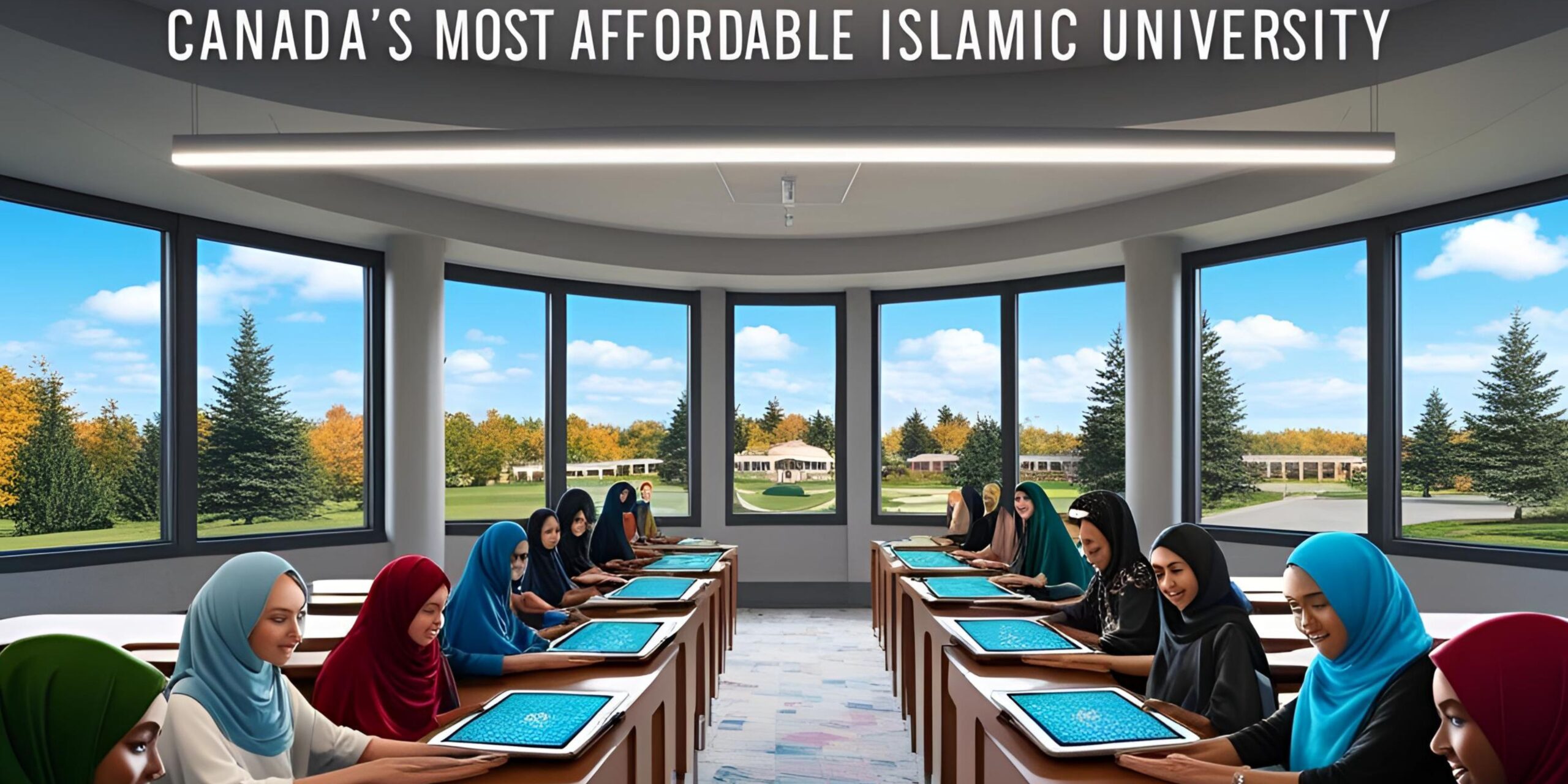Quran to Coding: If someone said a quiet Islamic university in Canada was outshining schools in Cairo, Istanbul, or Medina, you might laugh. But it’s true. One Canadian Islamic university is changing the game in Quranic education. Students from around the world are eager to enroll.
This isn’t just about affordable tuition or friendly campuses—it’s about a revolution in Islamic education. As 2025 unfolds, more international students are uncovering a Canadian university that fuses deep-rooted Islamic tradition with bold, forward-thinking strategies that even Ivy League schools are taking notes on.

The Best-Kept Secret in Global Islamic Education
Meet Al-Noor Islamic Institute of Canada
Tucked away in a quiet part of Ontario, the **Al-Noor Islamic Institute of Canada** might not have the fame of Al-Azhar or the history of Jamia Millia Islamia. However, in curriculum design, research, inclusivity, and tech adoption, it sets the standard.
Al-Noor wasn’t built overnight.Founded in 2009, a group of Canadian Muslim scholars and community leaders started a small Quran memorization centre. In the last 15 years, it has grown into a complete university. It now features modern facilities, an international faculty, and satellite centres in Vancouver and Montreal.
In 2025, it’s home to over 3,000 students from 27 different countries—and it’s growing.
Why Students Are Flocking In: The Real Reasons
A Curriculum That Connects the Dots
Al-Noor’s curriculum doesn’t just focus on classical Islamic studies. It connects students to the modern world in practical, powerful ways. Students can pursue degrees in:
- Quranic Exegesis & Linguistics
- Islamic Theology with Digital Ethics
- Comparative Religion & Interfaith Dialogue
- Islamic Finance & Blockchain
- Islamic Psychology & Mental Wellness
AI Meets Ijtihad
The university’s integration of artificial intelligence into Islamic studies is groundbreaking. AI platforms assist students in memorization, tajweed, and even comparative tafsir analysis. Al-Noor has even launched an AI-powered digital fatwa assistant (used only under supervision) to train students in legal reasoning.
Read more
Real Research, Real Impact
Unlike many traditional seminaries that remain insulated from global discourse, Al-Noor publishes in major journals and runs research collaborations with Western universities. Topics range from climate change in Islamic thought to cryptocurrency in Shariah finance.
Focus on Female Scholarship
Another reason students are drawn in? Women scholars aren’t just part of the institution—they help lead it. Al-Noor boasts:
- Female heads of department in Hadith, Fiqh, and Education
- Specialized Ifta programs for women
- Scholarships for women in rural areas or post-conflict regions
Affordability That Surprises Everyone
Most people associate North American universities with steep fees—but Al-Noor breaks the mold. With tuition as low as CAD $3,500/year and extensive scholarship programs, the education here is accessible to students from all income levels.
There’s even a “Pay-What-You-Can” program for students from refugee or war-torn backgrounds.
Inside the Campus: Tradition Meets Innovation
Walk into the Al-Noor campus, and you’ll feel the unique vibe immediately. A sprawling mosque designed with Andalusian architecture sits at the center. Surrounding it are solar-powered lecture halls, digital libraries, and virtual reality labs.
Students attend halaqas in the gardens, join coding-for-Quran clubs, and participate in youth leadership workshops alongside their theology classes. The energy is youthful, yet reverent.
Prayer isn’t an afterthought—it’s seamlessly built into academic life. And technology isn’t a distraction—it’s a tool of enlightenment.
Stories That Inspire the World
Bilal from Uganda
Take Bilal, a 25-year-old from Uganda. He came to Al-Noor on a scholarship after studying informally in Dar es Salaam. “I never imagined an Islamic institution would teach me how to develop an Islamic app using Python,” he laughs. Today, his app on daily duas has over 300,000 downloads.
Fatima from France
Or Fatima, a 19-year-old from France, who says she finally feels “seen and heard” as a female scholar. She’s now interning at a Canadian NGO focused on Muslim mental health, thanks to her Islamic Psychology coursework.
What Global Institutions Are Missing
Many legacy institutions still follow rigid syllabi from decades ago. While valuable, they sometimes fail to address contemporary challenges like Islamophobia, social media, or digital addiction through an Islamic lens.
Al-Noor, however, dives deep into these issues—creating scholars who are not just fluent in classical Arabic, but in global realities. That’s the edge.
This institution isn’t just producing Imams or teachers. It’s producing policy advisors, tech entrepreneurs, social workers, and artists—all grounded in Islamic values.
Canada’s Quiet Advantage in Faith-Based Education
Part of Al-Noor’s success is rooted in Canada’s unique environment:
- A multicultural society that values religious expression
- Government support for faith-based education
- Low crime, high quality of life
- Internationally recognized academic standards
This makes Canada not just a place to study, but a place to grow—spiritually, intellectually, and socially.
Global Recognition Is Catching On
In 2025, Al-Noor’s degrees are now accepted for postgraduate programs across Europe, the Middle East, and North America. Leading Islamic journals have published faculty papers. Governments are inviting Al-Noor scholars to advise on religious affairs.
And students are taking notice.
In fact, enrollment grew 40% in just the last year, driven largely by social media word-of-mouth, alumni testimonials, and YouTube lectures from charismatic professors.
Beyond the Degree: Real-Life Preparation
Al-Noor isn’t just concerned with diplomas—it prepares students for life. The career services team connects graduates with internships in:
- Masajid and Islamic schools across Canada and abroad
- Islamic fintech startups
- International development organizations
There’s also a dedicated business incubator for students launching Islamic products and services—from modest fashion brands to halal ethical investing apps.
The Future of Faith-Based Learning?
As the global Muslim population nears 2 billion, the demand for Islamic education is soaring. But with rising expectations for quality, inclusivity, and relevance, traditional institutions can’t rely on legacy alone.
Al-Noor Islamic Institute in Canada proves that the future belongs to those willing to blend authenticity with innovation.
And this hidden gem is leading the way.
FAQs About Al-Noor Islamic Institute of Canada
u003cstrongu003eCan I apply if I don’t speak Arabic?u003c/strongu003e
Yes. Beginners can enroll in Arabic foundation programs before starting their main studies.
u003cstrongu003eIs Al-Noor accredited?u003c/strongu003e
Yes. It is recognized by Canada’s Ministry of Education and has affiliations with universities in Malaysia, Turkey, and the UK.
u003cstrongu003eAre classes online or in-person?u003c/strongu003e
Both. Many students join remotely through the university’s award-winning eLearning platform.
u003cstrongu003eAre scholarships available?u003c/strongu003e
Yes. Over 40% of students receive full or partial scholarships based on merit or need.
u003cstrongu003eCan non-Muslims enroll?u003c/strongu003e
Yes. The university offers open-access Islamic civilization and ethics courses for all backgrounds.
Final Thoughts: Why Students Are Flocking to This Hidden Islamic Gem
In a noisy world, sometimes greatness grows in silence.
Al-Noor Islamic Institute may not have the brand recognition of legacy schools, but it has something arguably more important: vision, values, and a mission rooted in relevance.
If you’re looking for a place that honors Islamic tradition while preparing you for the future, don’t overlook this Canadian treasure.
It might just be the best decision of your life.
























Post Comment